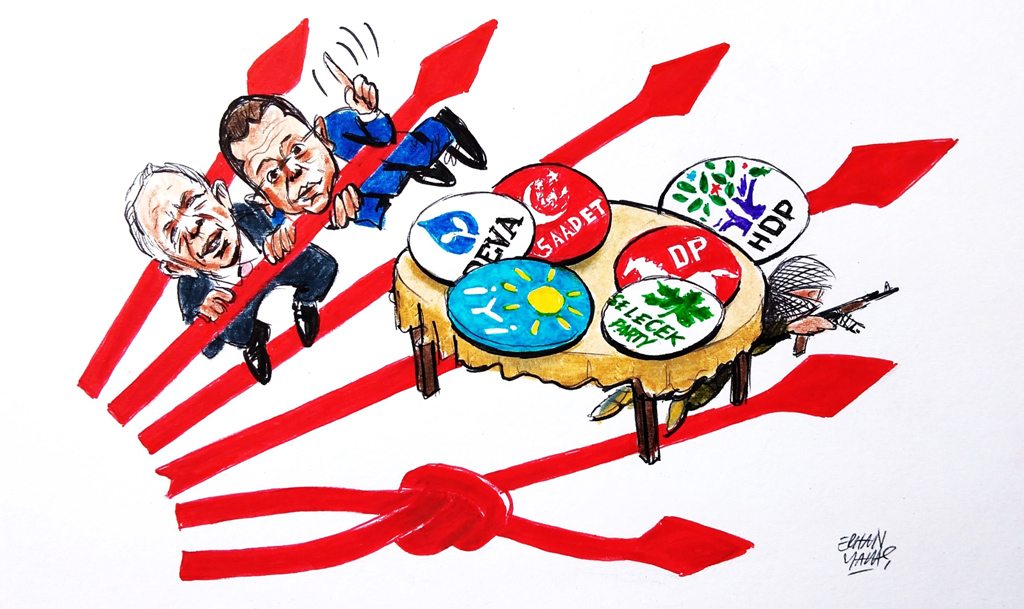The
municipal election campaign of the main opposition Republican People’s Party (CHP) has been riddled with crises, and I am not talking about their various statements that have become the subject of controversy. For example, this is not about the CHP chairperson’s remarks about Turkish citizens who paid for their exemption from military service or Istanbul Mayor Ekrem Imamoğlu’s comments on housewives.
Ahead of the March 31 election, the CHP faces three structural problems that it cannot seem to overcome. First, some incumbent mayors have made public the intraparty power struggle during the selection of candidates. President Recep Tayyip Erdoğan repeatedly portrayed that weakness (which the general public came to see as a clash between CHP Chair Özgür Özel and Imamoğlu versus former Chairperson Kemal Kılıçdaroğlu) as a sign of the CHP’s clumsiness. Moreover, the intra-party strife suggests that the party organization will be less united in 2024 compared to 2019 and 2023.
Here’s a case in point: Imamoğlu no longer enjoys the advantage of Canan Kaftancıoğlu, the CHP’s provincial chair in Istanbul, mobilizing the local chapter. Furthermore, the CHP base has not come to terms with the new leadership refusing to nominate allies of Kılıçdaroğlu – who insists that he has not retired from politics.
CHP's dilemma: Alliances and grassroots challenges
The CHP’s second crisis relates to its relationship with its former allies and the challenge of managing its limited cooperation with the Green Left Party (YSP), informally known as the Peoples' Equality and Democracy Party (DEM Party), a successor of the Peoples’ Democratic Party (HDP) that faces closure over its alleged links to the PKK terrorist organization. There are many discussions underway at the grassroots level, demonstrating how difficult it will be for the main opposition party to forge an alliance at the popular level.
It also seems that the war of words between the Good Party (IP) and the CHP’s mayoral candidates in Istanbul and Ankara (over the reluctance of those politicians to run for president last year) will not end until the municipal election. The IP must ensure that their supporters, who shifted toward the CHP at some point, end up voting for the IP’s mayoral candidates. Unhappy with the “operations” that the two CHP-affiliated mayors have launched against her party, IP Chairperson Meral Akşener highlighted how much importance she attaches to the upcoming election by saying that she would “go home” if her supporters do not vote for the IP.
Yet the CHP’s collaboration with the YSP in Istanbul, Ankara, Şanlıurfa, Mersin and Adana continues to cause problems. The People’s Alliance accuses the main opposition of shaking hands with the PKK’s commanders in northern Iraq. To make matters worse, there are multiple CHP politicians who have been speaking up publicly due to their frustration with that decision.
Discrimination debate
Indeed, the CHP’s mayoral candidate in Afyon, Burcu Köksal (who used to be an acting chair of that party’s parliamentary caucus), recently sent shock waves through the main opposition party by
saying that she would welcome “anyone but YSP members” to the municipality if she were to win the race.
The resulting "discrimination" debate, Özel’s attempt to downplay what happened by describing the candidate’s remarks as a misunderstanding and Imamoğlu’s call on that candidate to “look for another job or another party” did not change the candidate’s mind about refusing to let YSP members call the shots. In truth, that episode highlighted the challenge that CHP faces in predominantly conservative and nationalist provinces like Afyon. Having failed to join forces with the right-wing parties, the movement appreciates the difficulty of securing the support of right-leaning voters. To be clear, the YSP fielding its own candidates was not enough to mitigate the nationalist backlash against the main opposition party – whose limited collaboration with the YSP is considered a proper alliance.
The third crisis that plagues the main opposition party stems from the lack of a striking campaign theme against the backdrop of many distractions. That problem is partly linked to the March 31 campaign not fixating on polarization and the opposition bloc having fielded multiple candidates.
The lack of a theme adds to pressing problems like the opposition’s 2023 election defeat, the replacement of CHP’s chairperson, the disagreements over endorsements, the opposition’s inability to form an effective alliance and the failure to mobilize the provincial party organization.
It seems impossible for the main opposition party to overcome those three structural crises that give momentum to one another.
[Daily Sabah, March 12, 2024]







